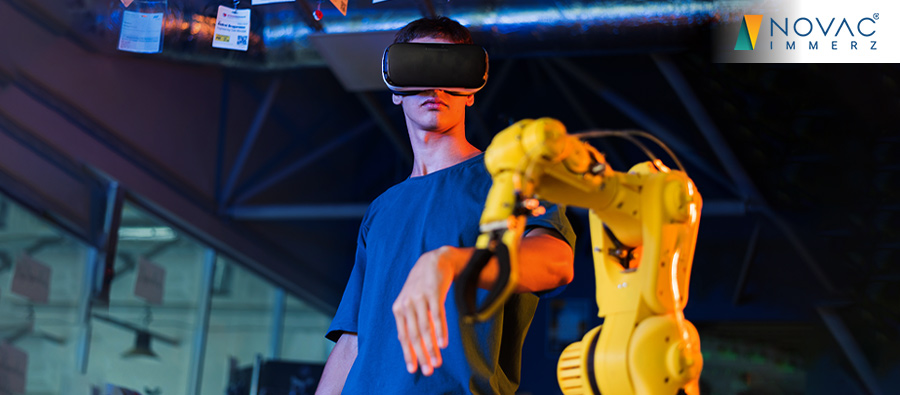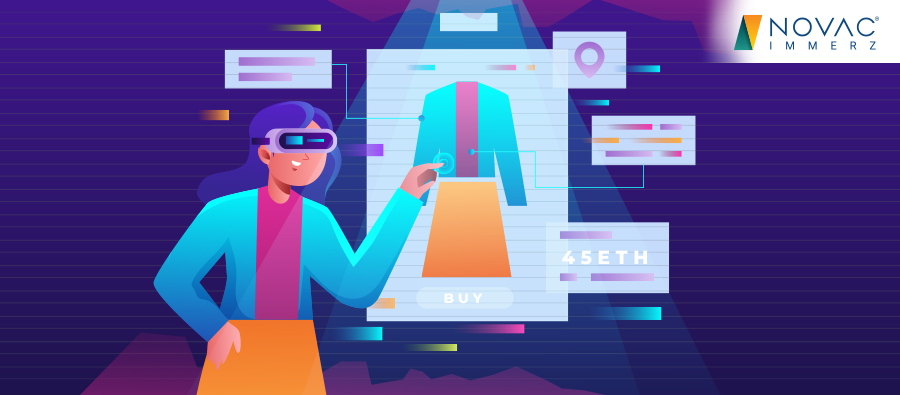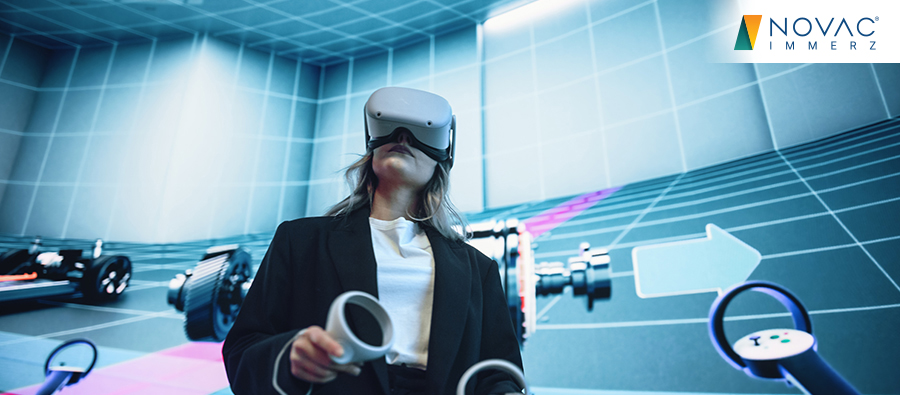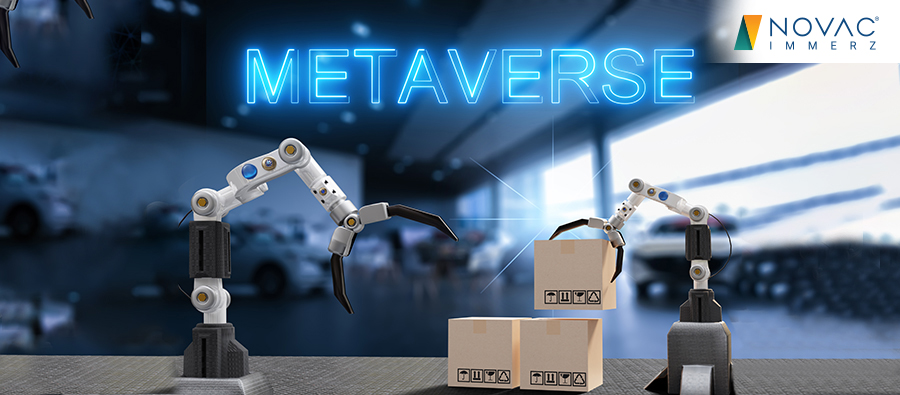Overview
The gaming and entertainment industry first used augmented and virtual reality as tools for
interaction and experience. Since then, they have become more business transformation tools,
with growing momentum in different industries. Integrating immersive technologies in routine
operations is perceived as a strategic investment with tangible business value.
Businesses have forever had to do more with less, particularly optimizing training
effectiveness, better engaging customers, removing errors, and cutting product life cycles.
Immersive technologies confront these obstacles directly by creating more intuitive,
effective, and interactive ways of working, learning new concepts, and selling products.
Digital innovation and immersion enabled by
Augmented Reality Solutions and Virtual Reality Solutions will be game-changers for
numerous organizations.
Now, let's examine how AR VR technology adoption in business enables them to enhance their
business strategies and improve their bottom lines.
The Impact of AR and VR on Business Innovation and ROI
AR and VR enhance business ROI in several ways. They are transforming companies'
thinking about core functions by bringing in new execution models, providing tangible
business results, and yielding quantifiable ROI.
-
Immersive Product Training
Traditional training approaches, including manuals, classrooms, and videos,
may assist workers in preparing for complex manual tasks. But using immersive on-the-job
training, companies can use VR simulation or AR overlays to enable learning activities.
Workers can engage with life-like settings that present real scenarios, from the factory
floor to the hospital ward or the sales desk.
Prepares employees for high-risk or complex scenarios without real-world consequences. It
also accelerates skill development and instills confidence in employees’ new roles or new
hires, improving safety and operational readiness.
The result? Fewer on-the-job errors and incidents, lower cost per employee trained over time
due to effective and scalable content.
-
Virtual Customer Experiences
Customers want more than information about a product; they want unforgettable experiences.
AR and VR allow businesses to deliver a whole host of immersive experiences, from product
visualization of furniture to virtual tours of a car showroom, and 360-degree product demos.
Immersive brand storytelling can help customers make confident buying decisions.
Improved customer involvement at key decision points enables customers to make sound
decisions and minimize hesitation in purchasing. AR/VR solutions enhance the brand
perception by creating differentiated and innovative experiences. By reducing product return
rates, customers can have an affinity for a brand for a lifetime.
-
Remote Collaboration and Design Prototyping
Design-intensive sectors such as architecture, automotive, and industrial
manufacturing can derive significant value from AR/VR-enabled workplace collaboration tools,
which is more than an upgrade from 2D models or flat blueprints, where now various teams can
move through 3D prototypes in common virtual spaces with real-time information sharing and
detailed overlays with instructions.
With AR/VR solutions, designs get faster approvals with fewer iterations.
Businesses can significantly save on logistics and travel expenses by reducing dependency on
travel or co-location for employee training. AR/VR solutions can detect any production
errors early, lowering prototyping costs and reducing the time to market for creating new
products.
-
Field Service and Support Innovation
Supporting intricate equipment or fixing problems out in the field usually
involves the expertise of a specialist, which may not always be present in the field. AR can
address this dilemma by providing remote expert assistance to technicians wearing
AR-supported glasses that lead them through each step or link with experts off-site.
Virtual Reality Solutions enhance the autonomy of field operations and technicians
by reducing the frequency of repeat service calls and costs. They minimize downtime in
mission-critical applications, which results in faster problem resolution. Production
companies can more efficiently utilize their core resources with remote troubleshooting.
Key Metrics for Calculating ROI for AR/VR Investments
Whenever companies invest in new technology, the initial question is: What do we get in
return? The ROI on investing in AR/VR technologies isn't elusive; it's measurable and
quantifiable and more likely to deliver results sooner than you think when done
strategically. ROI of AR/VR differs depending on the use cases, but there are standard
measurements to quantify its value. However, while examining the scalability of Immersive
Technologies, one should know how to assess ROI.
AR/VR-enabled learning modules are shorter than traditional training that
organizations typically provide. Many companies report a 30-50% reduction in training time
using before-and-after analysis.
For customer-facing applications like virtual try-ons or immersive showrooms,
a completed purchase journey indicates a good conversion rate, which can be tracked using
cost-benefit analysis.
AR-guided instruction can drastically lower human errors, saving costs,
especially in manufacturing or field services.
Track individual employees’ proficiency after implementing an Augmented
Reality solution training in lieu of the traditional onboarding process through
Kirkpatrick's model for measuring training ROI.
Use data analytics to track session length, frequency of learner
interactions, or re-engagement in immersive experiences through customer feedback loops to
determine perceived value of training and end-user satisfaction.
Utilizing AR and VR for Sustainable Business Development
AR VR Solutions are not a plug-and-play solution, yet with proper goals, a targeted
approach, defined areas, and the guidance of an experienced vendor, they can be potent
drivers of innovation and quantifiable business ROI.
- Identify Areas of Improvement That Align with Business Goals
Not every immersive application will suit your business. The first step is
identifying what your organization needs and how AR VR solutions can fill those gaps.
For example, reduced training time? A VR-based training module can do that
with quicker skill acquisition, personalized learning experiences, and timely sharing of
knowledge
Or are you looking to retain customers for your brand? AR-powered product
visualizations can smooth customers' purchase journeys when they walk into a store.
Select areas of pain points or bottlenecks that customers are experiencing
where visible improvements can be measured. They are high-cost or critical error zones,
repetitive manual tasks that require automation, customer contact points that influence
purchase decisions, employee training with a high learning curve, etc.
Using AR and VR for sustainable business development in a selected area of
focus, such as productivity, efficiency, sales, or customer experience, results with maximum
value, decreased risk, and ROI can be measured with greater accuracy.
- Start Small Pilot Programs with a Purpose
Another great and effective way to justify an AR/VR investment is through
controlled pilot programs, where businesses can
- Test the tech on a small scale in a real-world environment and see how they respond.
- Collect copious amounts of data and user feedback on the immersive training program
before scaling it across your organization.
This move not only builds confidence in using immersive technologies but
also creates a data-backed case for gaining the benefits of implementing AR/VR in business
operations before broader deployment across various departments and teams.
- Collaborate with an Experienced AR/VR Solutions Provider
Choosing the right technology partner is as important as choosing the right
area of improvement. A seasoned
AR VR Development Company can bring,
- Industry-specific insights
- Scalable development capabilities
- Guidance on hardware/software tech stack
- Support for integration with your existing systems
They can also help you navigate common pitfalls, validate the feasibility of
immersive technologies, and create impactful, results-driven solutions.
Summing-up
The futuristic role of AR/VR in business ROI maximization is now assimilating industries.
Immersive technologies are a core component that enhances daily business operations,
offering better results for organizations looking to innovate. But attempting something new
through innovation itself is not enough; what really counts is the ROI of the immersive
technology. Either through lowered operational expenses, improved efficiency, or improved
customer results, AR/VR can aid companies in reaching target objectives by altering core
functions in quantifiable terms.
At
Novac Immerz ,we help organizations turn immersive ideas into scalable solutions
that drive real business impact. Our team’s vast expertise, industry knowledge, and
executional strength can create a whole host of AR VR solutions curated for your
organization and start performing effectively.
Innovation begins with the first imagination. Let Novac Immerz be your
partner in offering innovative ideas for businesses with our suite of
AR VR Solutions.

Pradeep, Vice President

Having ignited minds in the golden age of eLearning transformed myself into a forerunner
in the
Metaverse's uncharted territory. From the democratizing power of eLearning to the
boundless
frontiers of the Metaverse, I have donned many hats – inspiring trainer, a meticulous
designer,
a savvy marketer, and an ingenious builder. Not long ago, with a developer's spirit,
introduced
and brought AR/VR business (Immerz) to life at Novac. Now, I lead a team of innovators,
wielding
the magic of Augmented and Virtual Reality to craft solutions that not only solve
business
challenges but redefine the very fabric of how we interact with the virtual worlds.








